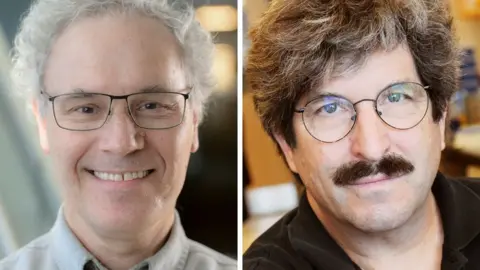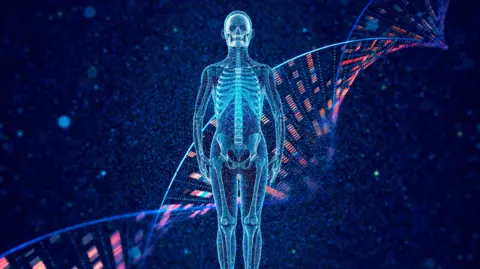Nobel Prize goes to microRNA researchers
 Reuters
ReutersThe Nobel Prize in Physiology or Medicine 2024 has been awarded to US scientists Victor Ambros and Gary Ruvkun for their work on microRNA.
Their discoveries help explain how complex life emerged on Earth and how the human body is made up of a wide variety of different tissues.
MicroRNAs influence how genes - the instructions for life - are controlled inside organisms, including us.
The winners share a prize fund worth 11m Swedish kronor (£810,000).
Every cell in the human body contains the same raw genetic information, locked in our DNA.
However, despite starting with the identical genetic information, the cells of the human body are wildly different in form and function.
The electrical impulses of nerve cells are distinct from the rhythmic beating of heart cells. The metabolic powerhouse that is a liver cell is distinct to a kidney cell, which filters urea out of the blood. The light-sensing abilities of cells in the retina are different in skillset to white blood cells that produce antibodies to fight infection.
So much variety can arise from the same starting material because of gene expression.
The US scientists were the first to discover microRNAs and how they exerted control on how genes are expressed differently in different tissues.
The medicine and physiology prize winners are selected by the Nobel Assembly of Sweden's Karolinska Institute.
They said: “Their groundbreaking discovery revealed a completely new principle of gene regulation that turned out to be essential for multicellular organisms, including humans.
"It is now known that the human genome codes for over 1,000 microRNAs.”
Allow X content?
Without the ability to control gene expression, every cell in an organism would be identical, so microRNAs helped enable the evolution of complex life forms.
Abnormal regulation by microRNAs can contribute to cancer and to some conditions, including congenital hearing loss and bone disorders.
A severe example is DICER1 syndrome, which leads to cancer in a variety of tissues, and is caused by mutations that affect microRNAs.
 Getty Images
Getty ImagesProf Ambros, 70, works at the University of Massachusetts Medical School, and Prof Ruvkun, 72, is a professor at Harvard Medical School.
Both conducted their research on the nematode worm - C. elegans.
They experimented on a mutant form of the worm that failed to develop some cell types, and eventually homed in on tiny pieces of genetic material or microRNAs that were essential for the worms' development.
This is how it works:
- A gene or genetic instruction is contained within our DNA
- Our cells make a copy, which is called messenger RNA or simply mRNA (you'll remember this from Covid vaccines)
- This travels out of the cell's nucleus and instructs the cell's protein-making factories to start making a specific protein
- But microRNAs get in the way by sticking to the messenger RNA and stop it working
- In essence the mircoRNA has prevented the gene from being expressed in the cell
Further work showed this was not a process unique to worms, but was a core component of life on Earth.
Prof Janosch Heller, from Dublin City University, said he was "delighted" to hear the prize had gone to Profs Ambros and Ruvkun.
"Their pioneering work into gene regulation by microRNAs paved the way for groundbreaking research into novel therapies for devastating diseases such as epilepsy, but also opened our eyes to the wonderful machinery that is tightly controlling what is happening in our cells.”
Previous winners
2023 - Katalin Kariko and Drew Weissman for developing the technology that led to the mRNA Covid vaccines.
2022 - Svante Paabo for his work on human evolution.
2021 - David Julius and Ardem Patapoutian for their work on how the body senses touch and temperature.
2020 - Michael Houghton, Harvey Alter and Charles Rice for the discovery of the virus Hepatitis C.
2019 - Sir Peter Ratcliffe, William Kaelin and Gregg Semenza for discovering how cells sense and adapt to oxygen levels.
2018 - James P Allison and Tasuku Honjo for discovering how to fight cancer using the body's immune system.
2017- Jeffrey Hall, Michael Rosbash and Michael Young for unravelling how bodies keep a circadian rhythm or body clock.
2016 - Yoshinori Ohsumi for discovering how cells remain healthy by recycling waste.
